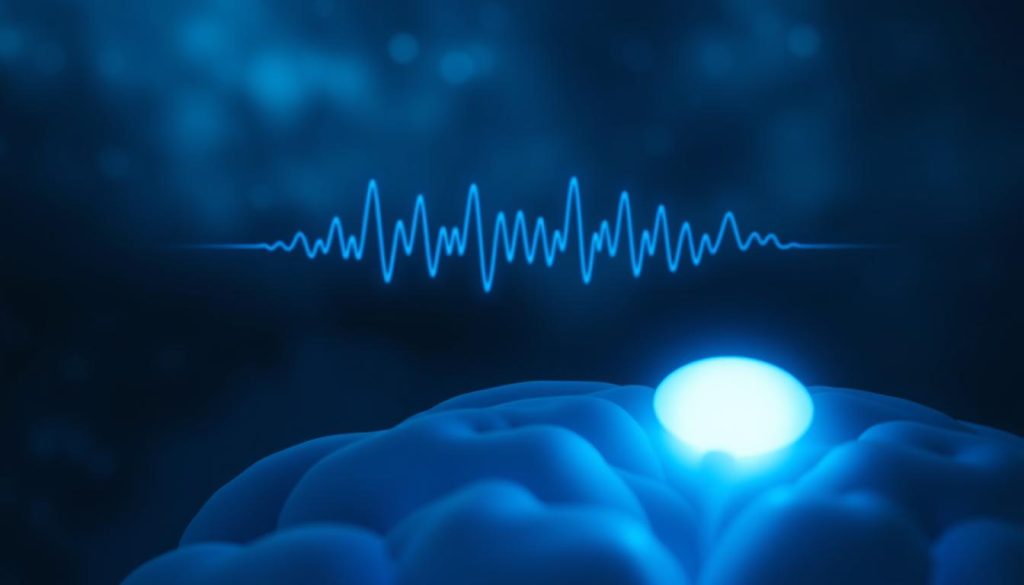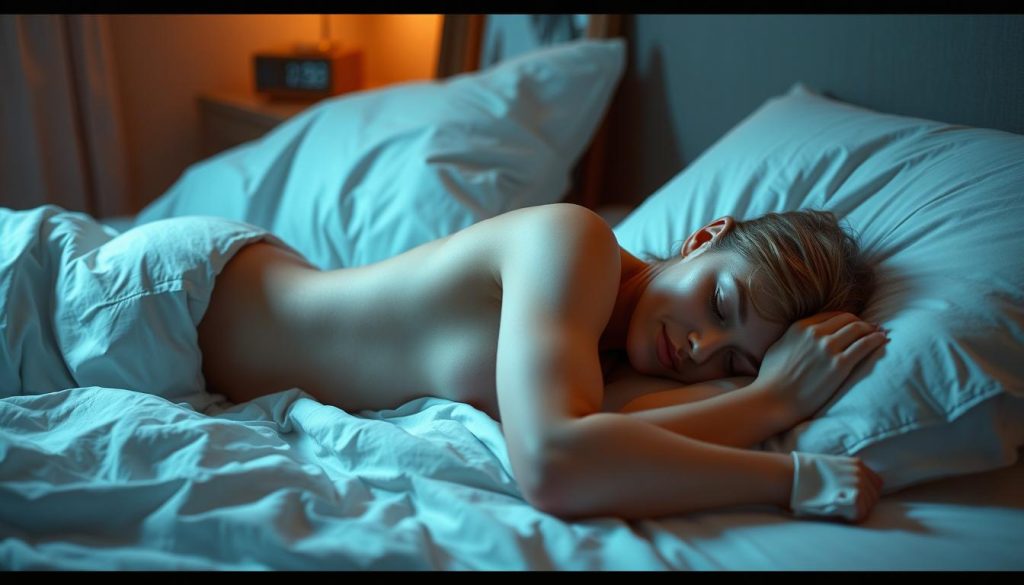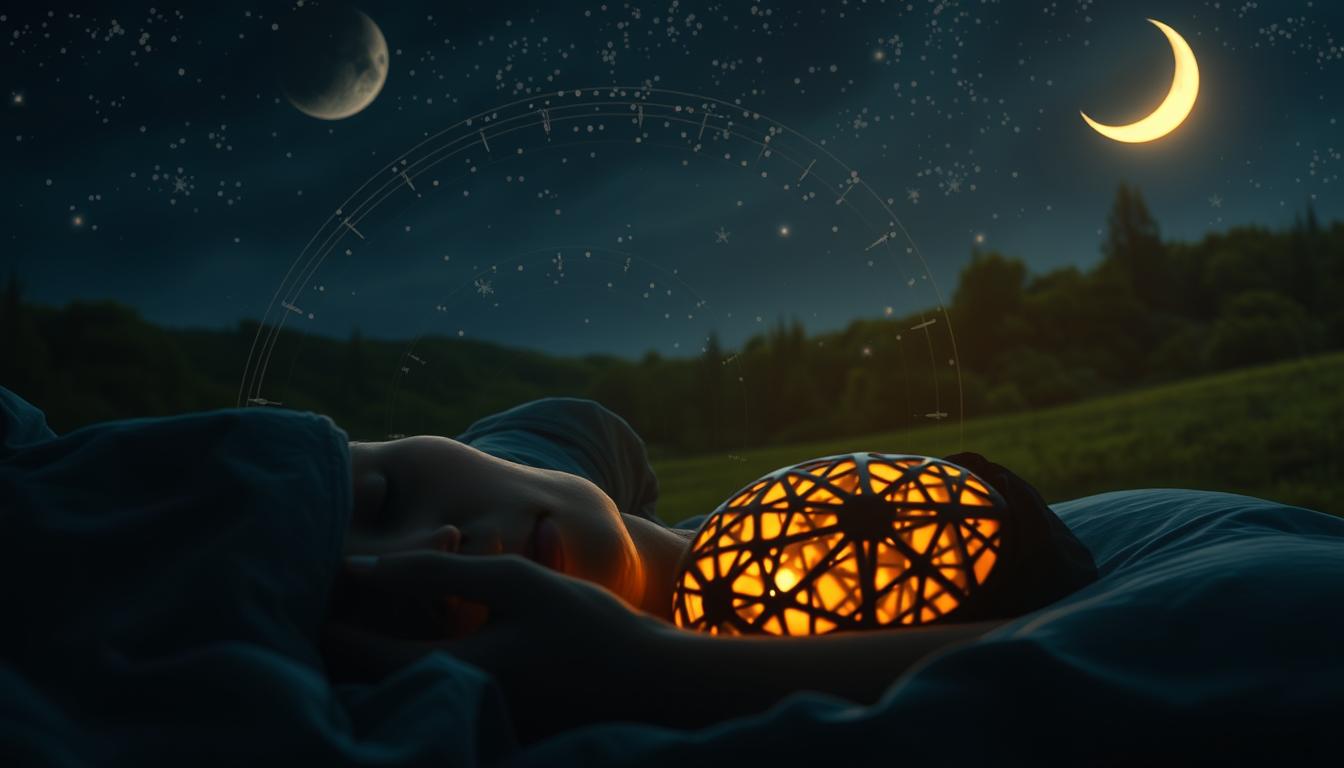Good sleep health is not just about how long you sleep. It’s also about how well you rest each night. Melatonin and the circadian rhythm play key roles in this. They help your body follow a natural sleep-wake cycle, which is vital for your health.
Learning about these elements can help you sleep better. It can lead to more restful nights. This is important for your overall well-being.
In this article, we’ll look at melatonin, the sleep hormone, and the circadian rhythm, your body’s clock. We’ll see how they work together to help you sleep better. We’ll also talk about natural sleep aids and how lifestyle choices and light affect your sleep.
Stay tuned for tips and new research on improving sleep. This will help you understand these important biological processes better.
Understanding Melatonin: The Sleep Hormone
Melatonin is a key hormone made by the pineal gland. It helps control sleep by telling the body it’s time to relax. This hormone is vital for setting the body’s sleep schedule.
What is Melatonin?
Melatonin is called a sleep hormone because it’s essential for our sleep cycle. It starts to release when it gets dark, helping us fall asleep and stay asleep. As night falls, melatonin levels go up, making us feel sleepy and ready for bed.
How Melatonin Affects Sleep
Melatonin does more than just help us sleep. It also helps our body’s internal clock stay in sync. This affects how sleepy we feel and other body functions like temperature. When melatonin is balanced, we sleep better and wake up feeling refreshed.
For people with sleep problems, taking melatonin supplements can help. It can improve sleep patterns and help the body’s clock stay on track.
The Role of Circadian Rhythm in Sleep Health
The circadian rhythm, or our biological clock, is key to our sleep patterns and health. It controls our sleep-wake cycle and other body functions. It needs light cues to stay in sync with the day.
Defining Circadian Rhythm
The circadian rhythm is a natural cycle that repeats every 24 hours. It manages hormone release, eating, digestion, and body temperature. Light from the sun helps our biological clock stay in tune with the day.
How Circadian Rhythm Regulates Sleep-Wake Cycles
The circadian rhythm affects our sleep patterns by controlling melatonin, the sleep hormone. Melatonin goes up at night, making us sleepy. Morning light makes it go down, making us alert. A good rhythm means better sleep and health.
Melatonin and Circadian Rhythm: A Perfect Duo for Better Sleep
Melatonin and the circadian rhythm work together to keep our sleep-wake cycles steady. Melatonin, made by the pineal gland, tells our body it’s time to sleep when it gets dark. As night goes on, melatonin levels rise, helping us sleep deeply.
But when we’re in the light, especially natural light, melatonin levels drop. This tells our body it’s time to wake up and be alert. This balance between melatonin and light is key for good sleep. Too much artificial light or irregular sleep can mess with this balance.
Knowing how melatonin and the circadian rhythm interact can really improve our sleep. By avoiding light before bed and keeping a regular sleep schedule, we can help our body’s internal clock. This supports better sleep and overall health.
Natural Sleep Aids: How Melatonin Supplements Can Help
Many people find melatonin supplements helpful for sleep. They are great for times when sleep patterns get messed up. Knowing when to use them and where to find melatonin naturally is key for better sleep.
When to Consider Melatonin Supplements
Melatonin supplements are good for jet lag, changing work hours, or irregular sleep. They help your body’s natural sleep cycle. Always talk to a doctor before starting them, as they can suggest the right amount for you.
Natural Sources of Melatonin
There are natural ways to get more melatonin too. Cherries, bananas, and walnuts are full of it. Eating these and keeping a good sleep space can help your body make more melatonin. Also, using light wisely and relaxing can help sleep better.

The table below shows foods high in melatonin and how they compare to supplements.
| Food | Melatonin Content (ng/g) | Benefits |
|---|---|---|
| Tart Cherries | 1300 | High melatonin content, natural sleep aid |
| Bananas | 20 | Supports serotonin production, enhancing sleep health |
| Walnuts | 900 | Rich in melatonin, supports cardiovascular health |
| Melatonin Supplements | Varies (1-10 mg tablets) | Convenient dosage, immediate impact on sleep patterns |
How Lifestyle Choices Impact Your Biological Clock
Your lifestyle choices greatly affect your body clock and sleep patterns. What you eat, how much you exercise, and your use of electronic devices are key. These factors can either help or hurt your circadian rhythm. Let’s look at how they impact your biological clock.
Diet is a big player. Eating a balanced diet full of nutrients helps your body regulate sleep better. Eating big meals close to bedtime can mess with your body clock, making it harder to fall asleep.
Exercise is also very important. It helps your body clock stay in sync with your sleep and wake times. Doing exercise in the morning or early afternoon can improve your sleep quality by helping your body follow its natural sleep patterns.
But, using electronics before bed is bad. The blue light from screens stops melatonin production, making it hard to fall asleep. Reducing screen time at night and starting a calming bedtime routine can help your body clock stay on track.
Choosing a healthy lifestyle is a strong way to keep your biological clock in check. By focusing on your diet, exercise, and electronic use, you can create habits that help your body stay in sync with its natural sleep cycle.
The Influence of Light Exposure on Sleep Patterns
In today’s world, light exposure is key to our sleep. The rise of screens and artificial lights has changed how we make melatonin, the sleep hormone. Knowing how light, especially blue light, affects melatonin is vital for good sleep.
The Effect of Blue Light on Melatonin Production
Blue light from devices like phones and computers can lower melatonin levels. This can mess up our sleep and make it hard to fall asleep. Blue light tricks our brain into thinking it’s still daytime, making it harder to sleep.

Strategies to Minimize Light Disruption
To fight light’s impact on sleep, try these tips:
- Limit screen time before bed: Avoid screens an hour before sleep to reduce blue light.
- Use blue light filters: Night mode on devices filters out blue light, helping you sleep better.
- Invest in blue light blocking glasses: These glasses block blue light from screens and lights, helping your sleep.
- Create a dim light environment: Dim lights in the evening help your body make melatonin.
By following these steps, you can protect your melatonin and sleep better.
Common Sleep Disorders Related to Circadian Rhythm Disruption
It’s important to understand how circadian rhythm disruption affects sleep disorders. These issues can greatly impact our sleep-wake cycle. This can lead to serious health problems.
Delayed Sleep Phase Disorder
Delayed Sleep Phase Disorder (DSPD) makes it hard for people to wake up early. Their sleep-wake cycle is delayed by two or more hours. This is common in teenagers and young adults.
| Symptoms | Causes | Treatments |
|---|---|---|
| Difficulty waking up in the morning, insomnia, excessive daytime sleepiness | Genetic predisposition, lifestyle factors, irregular sleep habits | Bright light therapy, chronotherapy, melatonin supplements |
Shift Work Disorder
Shift Work Disorder affects those who work odd hours, like night shifts. This schedule messes with their natural sleep-wake cycle. It can cause many health problems.
| Symptoms | Causes | Treatments |
|---|---|---|
| Insomnia, excessive sleepiness during waking hours, reduced alertness | Irregular work hours, lack of natural light, high stress | Consistent sleep schedule, strategic light exposure, naps, melatonin supplements |
Practical Tips for Regulating Your Body Clock
Keeping your body clock in sync is key for good health. Start by practicing good sleep hygiene. This means going to bed and waking up at the same time every day, even on weekends.

Light exposure is also crucial. Our bodies react to light, especially blue light from screens. Try to avoid screens for at least an hour before bed. Morning sunlight helps your body know it’s time to be awake.
Creating a cozy sleep space is important too. Make sure your bedroom is cool, dark, and quiet. A good mattress and pillows help you sleep better. Blackout curtains or a white noise machine can also help.
Don’t eat heavy meals or drink caffeine close to bedtime. They can make it hard to fall asleep. Exercise is good, but do it a few hours before bed to avoid staying awake.
Relaxing before bed is also helpful. Try meditation, deep breathing, or reading to calm down. These activities help you sleep better.
What you eat and drink matters too. Eating well and staying hydrated helps your body and sleep. Some foods, like those with magnesium or tryptophan, can help you sleep.
Being mindful of your daily habits can greatly improve your sleep. By following these tips, you can better sync your body’s natural rhythms. This leads to better sleep and health.
The Future of Sleep Research: Advances in Melatonin and Circadian Rhythm Studies
The study of sleep is growing, giving us new views on melatonin and circadian rhythms. Recent studies show melatonin’s big role in sleep and health. Now, scientists are working on new treatments using melatonin to help sleep disorders.
Studies on circadian rhythms are also making progress. New tech like wearable sleep trackers helps scientists understand sleep cycles better. This data helps create personalized plans to improve sleep and health.
Research in sleep science is crucial, especially in today’s fast world. New tech and methods are leading to big discoveries. As we learn more about melatonin and circadian rhythms, we’re getting closer to better sleep for all.

